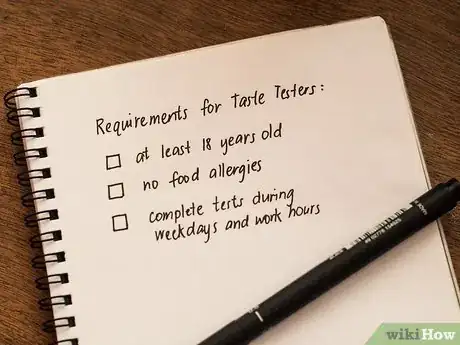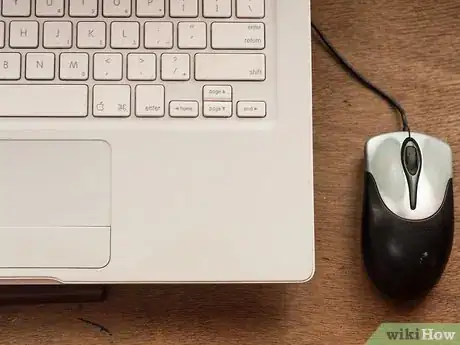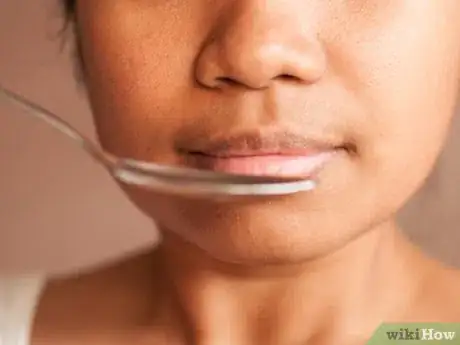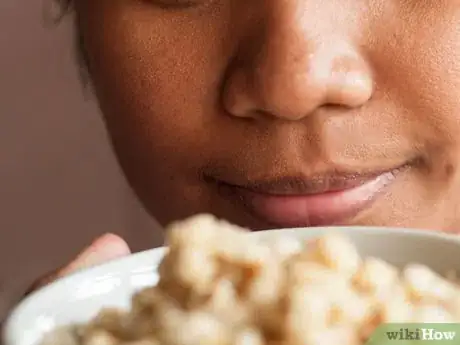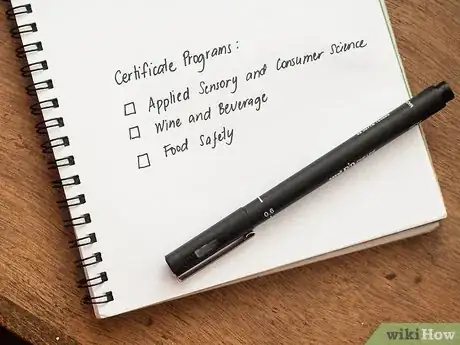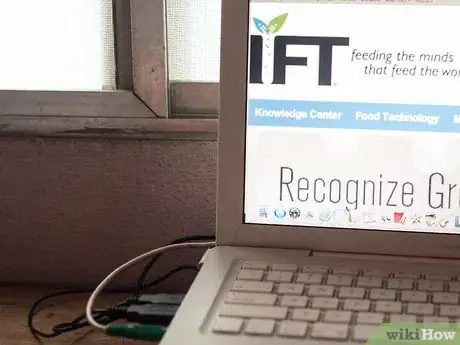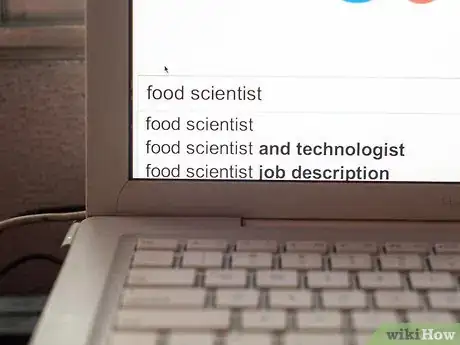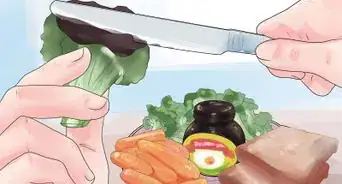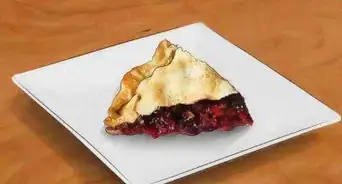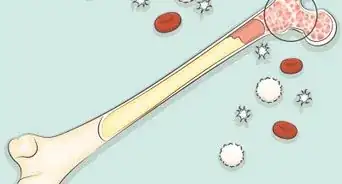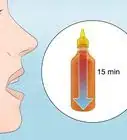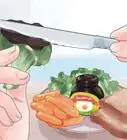wikiHow is a “wiki,” similar to Wikipedia, which means that many of our articles are co-written by multiple authors. To create this article, 17 people, some anonymous, worked to edit and improve it over time.
There are 14 references cited in this article, which can be found at the bottom of the page.
This article has been viewed 199,960 times.
Learn more...
The term “taste tester” can be applied to a variety of different jobs. There are consumer taste testers, who help food manufacturers decide when a product is ready for the market. And there are what we’ll refer to as “professional” taste testers, which include food scientists and sensory analysts. Professional taste testers usually work directly for a food manufacturer or other related companies. They are part of a team that create new food products, and improve existing products. Only professional taste testers require a formal education, usually one of the physical sciences.
Steps
Becoming a Consumer Taste Tester
-
1Research consumer taste testing opportunities. A variety of organizations (food manufacturers, restaurants, consulting companies, governments and universities) hire consumers to test food products. Being a consumer taste tester is not a full-time job, so you’ll want to look for an opportunity close to where you already live. The best place to start is with a Google search for "taste testers" in your area.
- Consumer taste testers get paid approximately $15/hour or up, but sometimes are paid per test, instead of per hour.
- If you know of a specific organization in your area, start your search on their website. Some examples of where to look include the following:
- McCormick & Company is located in Hunt Valley, Maryland.[1]
- The Consumer Product Testing Centre via the Government of Alberta is located in Edmonton, Alberta.[2]
- The National Food Lab is located in Livermore, California.
- The North Carolina State University Sensory Service Centre is located in Raleigh, North Carolina.[3]
-
2Check eligibility requirements. Organizations require that, as a taste tester, you be at least 18 years old to participate in their programs. And you cannot have any existing food allergies. You will also be required to complete taste tests during weekdays and during work hours.[4]
- Each organization may have their own, specific requirements as well. You can confirm these requirements on their website when you complete an application.
- Also be aware that some organizations may have a limit on the number of times you can participate in a consumer taste test in a given year.[5]
Advertisement -
3Submit an application. Complete the required application or registration form from the organization's website. Most applications can be completed and submitted online, but a few are still require a paper application to be submitted via mail.
- Applications will require basic items like your name, address, phone number, email address, gender, and birthdate.
- You may also be asked about your food preferences, including whether you are a vegetarian or vegan.
-
4Answer more detailed screening questions. All the information you provide to a taste test organization is stored in a database. The organization then uses the database to find the right people to participate in each taste test - based on the information you’ve provided to them. In order to ensure they can find the right testers for each opportunity, the organization may send you questionnaires asking very specific questions about food.
- Be sure to answer any questions that are asked honestly, as your answers will impact what tests you’ll be asked to participate in.
- For example, some tests may require males who are 20 to 35 years old. The organization will query the database to find all testers who are male and who are between the ages of 20 and 35. They will then reach out to some of those testers to see who may be interested in participating.
-
5Sign-up for taste test opportunities. In addition to reaching out to you on a proactive basis, some organizations have an online portal for testers only. You’ll be able to sign into this section of the website to view potential testing opportunities. Keeping track of potential opportunities on your own will help ensure you’re able to participate in more tests.
- Organizations, like FPI Testers, also post available tests on their Facebook and Twitter accounts. In order to make sure you don’t miss any great opportunities, follow the accounts for the organization for which you’re a member and keep track of what they post on social media.
-
6Prepare yourself for tasting. Once you’re all setup with an organization, it’s time to prepare for an actual taste test. Information about what to expect at a taste test can be found on the organization’s website, and, if anything specific is required, they’ll send that information to you directly.[6]
- Before a taste test, the organization will send you information about the ingredients in the items you’ll be testing. Review this information to ensure you won’t have an issue with any of them.
- Some additional ways to prepare are included below:
- Be on time, or a little early.
- Do not eat or smoke within the 30 minutes before your test.
- Do not wear fragrant items like perfume or cologne.
- Do not bring children with you.
- You will also be required to turn your cell phone off when in the test.
- Depending on the type of test, you may also be required not to speak to anyone else while at the test.
Becoming a Food Scientist
-
1Determine if a food science or sensory analysis career is right for you. Among other things, one thing many food scientists (or sensory analysts) do is help develop new food products, or make existing food products better. In order to make sure the food meets consumer expectations, they spend time organizing taste tests with consumers and analyzing the results of those tests. Food scientists also get to taste test their own food, before it is tested by consumers.[7]
- At a minimum, food scientists require a Bachelor’s of Science degree from a post-secondary school, normally in a food science-related major.
- Many food scientists go onto pursue graduate degrees as well, especially if they’re interested in academic research.
- Food scientists earn approximately $58,000 per year.[8]
-
2Obtain the appropriate level of education. If you decided to pursue a career in food science or sensory analysis, and you don’t already have the appropriate education, you will need to enroll in a Bachelors of Science program at a university. All major universities have a science faculty where you can earn a Bachelors of Science in a general area like biology or chemistry. But some schools have special food science departments where they teach you more specific skills pertaining to food production. Examples of some North American options are as follows:
- The University of Nebraska-Lincoln has an undergraduate degree in Food Science and Technology.[9]
- North Carolina State University has undergraduate programs in Food Science, Bioprocessing Science, Nutrition Science, and Applied Nutrition.[10]
- The Culinary Institute of America has undergraduate programs in Culinary Arts, Applied Food Studies, and Culinary Science.[11]
- The University of Florida has undergraduate programs in Dietetics, Food Science and Nutritional Sciences.
- The University of Alberta has undergraduate programs in Nutrition, Food Science, and Dietetics.
-
3Think about taking an after-degree program. Some universities, in addition to degree programs, also offer after-degree or certificate programs in more specific subjects associated with sensory analysis. If you already have a Bachelors of Science, but did not major in food sciences or something related, consider taking a certificate program to increase your skills in sensory sciences. Some options to consider are as follows:
- The University of California-Davis offers an Applied Sensory and Consumer Science certificate program, which can be completed online.[12]
- The Culinary Institute of America offers a Wine and Beverage graduate certificate program at their Napa Valley, California campus.[13]
- The University of Nebraska-Lincoln offers a Food Safety and Defence graduate certificate, which can be completed online.[14]
-
4Join a food industry organization. Like any major industry, food scientists have professional associations for members of that industry to join. Members of the association are able to keep up-to-date on industry news and events, and research developments. Food scientists, or sensory analysts, have a couple options for associations::
- The Institute of Food Technologists (IFT) has several membership levels to choose from, including “regular” member, professional and student.[15]
- The Food Institute, which is part of a non-profit organization called the American Institution of Food Distribution, offers memberships for anyone. Memberships offer access to a large variety of information pertaining to the American food industry.[16]
-
5Review food science and sensory analysis job postings. University career centres, the Institute of Food Technologists and other career websites will post jobs associated with the food industry. You can also review the career websites of food manufacturers or governments if you know of a specific organization where you’d like to work.
- Search for “food scientist,” “sensory scientist,”“sensory analyst,” or “sensory technologist" in order to find these specific positions.
-
6Make yourself stand out as a food scientist or sensory analyst. While a specific educational background is required, chances are most, if not all, applicants will have the same degree as you. To make yourself stand out, consider enhancing the following skills via further education and practice:[17]
- critical thinking and problem solving
- active listening and learning
- technical and scientific writing
- knowledge of industry standards and regulations
- data and quality control analysis
- cooperative and collaboration within a team environment
Community Q&A
-
QuestionCan a food taster be moved higher up in position?
 Community AnswerI suppose it depends on the company.
Community AnswerI suppose it depends on the company. -
QuestionWhat classes should I take to be a professional chocolate taster?
 Community AnswerYou should try to get a degree in Nutrition and Food Technology or in Applied Sciences. To get the job of a professional chocolate taste tester, you need to have knowledge about chocolate, such as how to mold, melt, and temper chocolates. You also need to have a passion for chocolate and possess basic marketing and public relations skills. It's a bonus if you stay updated with newest trends.
Community AnswerYou should try to get a degree in Nutrition and Food Technology or in Applied Sciences. To get the job of a professional chocolate taste tester, you need to have knowledge about chocolate, such as how to mold, melt, and temper chocolates. You also need to have a passion for chocolate and possess basic marketing and public relations skills. It's a bonus if you stay updated with newest trends.
Warnings
- As a taste tester you will most likely be required to sign a legal document releasing the organization from any legal ramifications should you have a negative reaction to any food you taste test. Read over every document you are required to sign carefully so you understand the expectations and requirements of both yourself and the organization.⧼thumbs_response⧽
References
- ↑ http://www.mccormickcorporation.com/consumer-testing.aspx
- ↑ http://www1.agric.gov.ab.ca/$department/deptdocs.nsf/all/fpdc10831
- ↑ http://sensory.ncsu.edu/food-tastings/
- ↑ http://www1.agric.gov.ab.ca/$department/deptdocs.nsf/all/fpdc10831
- ↑ http://www.mccormickcorporation.com/consumer-testing.aspx
- ↑ http://www1.agric.gov.ab.ca/$department/deptdocs.nsf/all/fpdc10831
- ↑ http://www.bls.gov/ooh/life-physical-and-social-science/agricultural-and-food-scientists.htm#tab-2
- ↑ http://www.bls.gov/ooh/life-physical-and-social-science/agricultural-and-food-scientists.htm#tab-5
- ↑ http://foodsci.unl.edu/courseofstudy
- ↑ http://fbns.ncsu.edu/academic-programs/bachelors-degrees/
- ↑ http://www.ciachef.edu/degree-and-certificate-programs/
- ↑ https://extension.ucdavis.edu/certificate-program/applied-sensory-and-consumer-science-certificate-program
- ↑ http://www.ciachef.edu/wine-and-beverage-graduate-certificate-program-ca/
- ↑ http://www.unl.edu/gradstudies/prospective/programs/Cert_FoodSafety
- ↑ https://www.ift.org/membership/membership-types.aspx
- ↑ https://foodinstitute.com/joinfi
- ↑ http://www.onetonline.org/link/summary/19-1012.00
About This Article
If you're interested in becoming a taste tester, look online for places that might be hiring near you by using “taste tester” as your search words. Or, if you know about local food manufacturers or restaurants, check out their websites! When you find an opening, read carefully to be sure you meet the requirements, like being 18 or older, or not having any food allergies. Time for your first taste test? Don't eat or smoke at least 30 minutes before, and hold off on the perfume or cologne until after the test. To learn more, such as how to get a career in food science, keep reading the article!

